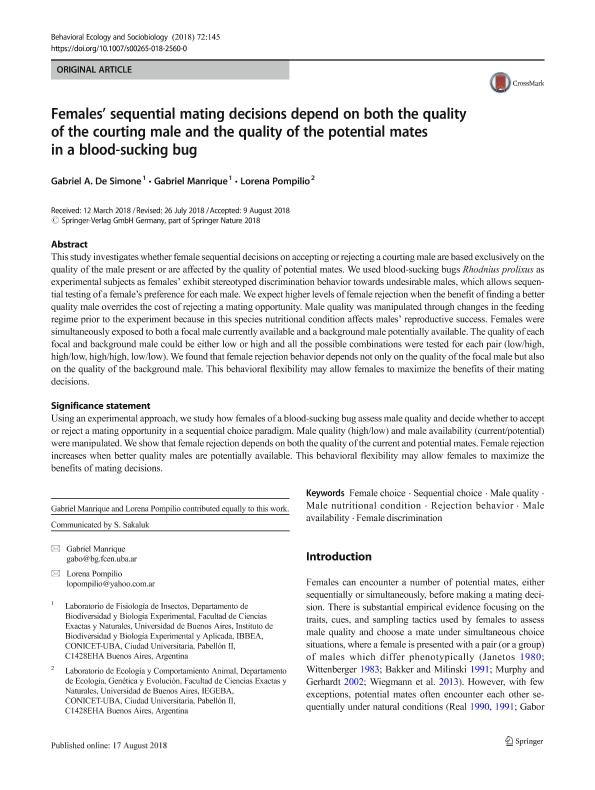Mostrar el registro sencillo del ítem
dc.contributor.author
de Simone, Gabriel Alejandro

dc.contributor.author
Manrique, Gabriel

dc.contributor.author
Pompilio, Lorena

dc.date.available
2020-02-03T15:30:21Z
dc.date.issued
2018-09
dc.identifier.citation
de Simone, Gabriel Alejandro; Manrique, Gabriel; Pompilio, Lorena; Females sequential mating decisions depend on both the quality of the courting male and the quality of the potential mates in a blood-sucking bug; Springer; Behavioral Ecology And Sociobiology; 72; 145; 9-2018; 1-9
dc.identifier.issn
0340-5443
dc.identifier.uri
http://hdl.handle.net/11336/96534
dc.description.abstract
This study investigates whether female sequential decisions on accepting or rejecting a courting male are based exclusively on the quality of the male present or are affected by the quality of potential mates. We used blood-sucking bugs Rhodnius prolixus as experimental subjects as females’ exhibit stereotyped discrimination behavior towards undesirable males, which allows sequential testing of a female’s preference for each male. We expect higher levels of female rejection when the benefit of finding a better quality male overrides the cost of rejecting a mating opportunity. Male quality was manipulated through changes in the feeding regime prior to the experiment because in this species nutritional condition affects males’ reproductive success. Females were simultaneously exposed to both a focal male currently available and a background male potentially available. The quality of each focal and background male could be either low or high and all the possible combinations were tested for each pair (low/high, high/low, high/high, low/low). We found that female rejection behavior depends not only on the quality of the focal male but also on the quality of the background male. This behavioral flexibility may allow females to maximize the benefits of their mating decisions.
dc.format
application/pdf
dc.language.iso
eng
dc.publisher
Springer

dc.rights
info:eu-repo/semantics/openAccess
dc.rights.uri
https://creativecommons.org/licenses/by-nc-sa/2.5/ar/
dc.subject
FEMALE CHOICE
dc.subject
FEMALE DISCRIMINATION
dc.subject
MALE AVAILABILITY
dc.subject
MALE NUTRITIONAL CONDITION
dc.subject
MALE QUALITY
dc.subject
REJECTION BEHAVIOR
dc.subject
SEQUENTIAL CHOICE
dc.subject.classification
Zoología, Ornitología, Entomología, Etología

dc.subject.classification
Ciencias Biológicas

dc.subject.classification
CIENCIAS NATURALES Y EXACTAS

dc.title
Females sequential mating decisions depend on both the quality of the courting male and the quality of the potential mates in a blood-sucking bug
dc.type
info:eu-repo/semantics/article
dc.type
info:ar-repo/semantics/artículo
dc.type
info:eu-repo/semantics/publishedVersion
dc.date.updated
2019-10-02T19:12:51Z
dc.journal.volume
72
dc.journal.number
145
dc.journal.pagination
1-9
dc.journal.pais
Alemania

dc.description.fil
Fil: de Simone, Gabriel Alejandro. Consejo Nacional de Investigaciones Científicas y Técnicas. Oficina de Coordinación Administrativa Ciudad Universitaria. Instituto de Biodiversidad y Biología Experimental y Aplicada. Universidad de Buenos Aires. Facultad de Ciencias Exactas y Naturales. Instituto de Biodiversidad y Biología Experimental y Aplicada; Argentina
dc.description.fil
Fil: Manrique, Gabriel. Consejo Nacional de Investigaciones Científicas y Técnicas. Oficina de Coordinación Administrativa Ciudad Universitaria. Instituto de Biodiversidad y Biología Experimental y Aplicada. Universidad de Buenos Aires. Facultad de Ciencias Exactas y Naturales. Instituto de Biodiversidad y Biología Experimental y Aplicada; Argentina
dc.description.fil
Fil: Pompilio, Lorena. Consejo Nacional de Investigaciones Científicas y Técnicas. Oficina de Coordinación Administrativa Ciudad Universitaria. Instituto de Ecología, Genética y Evolución de Buenos Aires. Universidad de Buenos Aires. Facultad de Ciencias Exactas y Naturales. Instituto de Ecología, Genética y Evolución de Buenos Aires; Argentina
dc.journal.title
Behavioral Ecology And Sociobiology

dc.relation.alternativeid
info:eu-repo/semantics/altIdentifier/doi/https://doi.org/10.1007/s00265-018-2560-0
dc.relation.alternativeid
info:eu-repo/semantics/altIdentifier/url/https://link.springer.com/article/10.1007%2Fs00265-018-2560-0
Archivos asociados
